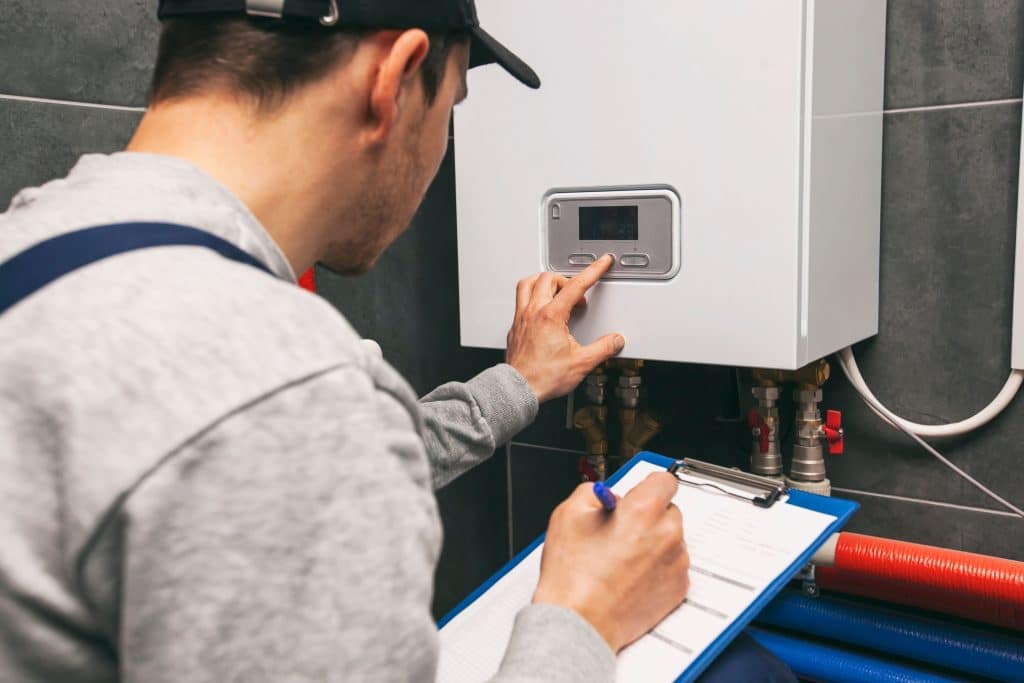
Water Heater Efficiency Ratings & Local Regulations – Are You Up to Date?
Water heater efficiency ratings, based on energy factor (EF) or uniform energy factor (UEF), ensure effective operation, energy savings, and reduced costs. High-efficiency models like tankless and solar heaters offer superior performance, but local regulations and building codes must also be met. This is just to ensure compliance and safety.
In cities like Sacramento, local codes often require water heaters to meet specific energy standards and safety protocols. These regulations ensure that water heaters are environmentally friendly and safe for residential use. Ignoring these requirements could result in fines, unsafe installations, or even void warranties.
So, when you are hiring a water heater repair service, always consider a licensed professional in Sacramento is essential. These professionals help you with water heater repair in Sacramento, as they are well-versed in both the latest energy efficiency models and local compliance codes.
Curious to know more about your water heater efficiency and local regulations? Read till the end, as we have discussed them in detail.
| Quick Hot Water Solutions – Expert Installation Just a Click Away. |
What Are Water Heater Efficiency Rating Categories?
The efficiency with which a water heater transforms energy into hot water is indicated by its efficiency rating. The more effectively a water heater converts energy into hot water, the greater its efficiency rating.
Accordingly, a water heater with a higher efficiency will consume less energy and be less expensive to run than one with a lower efficiency. Energy Factor (EF) and Uniform Energy Factor (UEF) are the two primary categories of water heater efficiency ratings.
Let’s discuss them –
1. Energy Factor (EF)
The Energy Factor (EF) measures how efficiently a water heater converts energy into hot water over 24 hours. It is determined by considering –
- Standby losses (heat lost when the water heater is idle)
- Recovery efficiency (how efficiently the water heater can replace the hot water used)
A higher EF rating indicates better energy efficiency, meaning the water heater will use less fuel or electricity to produce the same amount of hot water. EF ratings typically range from 0.5 to 2.0, with values closer to 2.0 being the most efficient.
Traditional tank water heaters usually have lower EF ratings compared to modern, more efficient units like tankless or hybrid models. However, EF alone does not account for factors such as installation or operating costs.
Hence, it’s important to consider the overall energy consumption and usage patterns when choosing a water heater.
2. Uniform Energy Factor (UEF)
The Uniform Energy Factor (UEF) provides a more accurate measurement of water heater efficiency by simulating performance over a year of typical household use. The UEF takes into account variations in usage patterns and hot water demand. Thus offering a more comprehensive picture of how well the water heater performs.
UEF ratings vary depending on the type of water heater. Tankless and hybrid models typically receive ratings between 0.5 and 1.0. The higher the UEF value, the more efficiently the water heater operates.
Unlike the EF, which measures only short-term performance, the UEF reflects efficiency over long-term use, making it a better indicator of real-world energy consumption.
3. Thermal Efficiency
Another metric that is commonly applied to commercial boilers and water heaters is thermal efficiency. It shows the percentage difference between the heat energy input and the heat energy provided to the water.
A 90% thermal efficiency indicates that the water heater uses 90% of its energy to heat the water and loses the remaining 10% to the environment. This measure is essential for understanding the energy efficiency of bigger, more intricate water heating systems – frequently found in commercial environments.
Other factors that influence water heater efficiency include insulation, fuel type, and water heater size, all of which impact energy use and operational costs over time.
| Restore your Hot Water Flow – Schedule your Water Heater Repair now! |
What Is The Local Water Heater Regulation Of Sacramento, California?
California implemented strict water heater regulations in 2024. Compliance is about accepting responsibility for our world and our finances – not only about following the law.
The goal of these new guidelines is to minimize energy waste while maximizing performance. This will lower overall utility costs and promote sustainability.
Sacramento, California’s Water Heater Regulations
1. Energy Efficiency Standards
California enforces strict energy efficiency standards for water heaters, aligned with the 2015 U.S. DOE regulations. Sacramento ensures compliance, requiring new installations to meet these guidelines and reducing energy use and emissions.
As discussed above, water heaters are rated using an Energy Factor (EF) or a Uniform Energy Factor (UEF), which indicates how efficiently a water heater converts energy into hot water. Higher ratings mean better efficiency.
Before starting a water heater installation – it’s important to select a model that meets the local efficiency requirements.
2. Earthquake Strapping
Did you know – Sacramento lies in an earthquake-prone region? Hence, safety measures should be taken to secure water heaters in case of seismic activity. The California Plumbing Code requires water heaters to be properly strapped to prevent tipping over during an earthquake.
These straps must be placed at both the upper and lower third of the water heater and secured to wall studs. Failure to comply with these requirements can result in safety hazards and potential penalties.
3. Permit Requirements
As per the regulation – you must obtain a permit before installing or replacing a water hearer. It’s not just for traditional or new models. This rule applies to all types of water heaters – whether tankless, hybrid water heater or gas models. The permit ensures that the installation is inspected for safety and compliance with local codes.
Hiring a professional for water heater service is recommended since licensed contractors are familiar with the necessary permits and regulations. They will make sure that the installation is up to code and passes inspection, saving you potential headaches down the line.
4. Catch Pan Installation
According to the water heater installation code, the installer must also install a catch pan if they suspect a leak from the water heater that could result in water damage.
It collects any drips and shields the house from water damage that could result in –
- Flooding
- Mold growth
- Warped floors
The catch pan is installed underneath the leak site.
| Stay ahead of Water Heater Woes – Book your Installation Now! |
5. Material Needs for Catch Pans
Number 24 galvanized steel or plastic components with a minimum thickness of.9mm are required for catch pan composition.
Alternative materials that the particular water heater manufacturer has authorized may occasionally also satisfy requirements. Any plastic catch pans used with gas water heaters must be made of a substance whose flame spread index is less than 25.
6. Venting and Clearance
Gas water heaters, in particular, must have adequate ventilation to prevent carbon monoxide buildup. The venting system must meet specific requirements for size, material, and installation to ensure that gases are safely directed outside your home.
Additionally, water heaters need proper clearance from walls and other blockages to allow for proper airflow and safe operation.
7. Relief Valve for Temperature and Pressure
The pressure and temperature relief (P&T) valve is an important safety component that is mandated by the new regulations. It is advisable to properly install this valve and pipe it to the building’s exterior.
It acts as a safety device to stop possible explosions if the water heater’s internal pressure or temperature rises above the suggested limit. You must consider routine inspections and maintenance to ensure that the P&T valve functions properly.
8. Expansion Tank
Expansion tanks are now a necessary part of some water heating systems. It helps to manage pressure variations and avoid system damage. According to the regulation, expansion tanks are required if your system has a backflow preventer or pressure regulator.
These tanks aid in preserving the water heater’s structural integrity by absorbing excess pressure, preventing leaks or ruptures that can cause significant property damage.
9. Water Pressure Regulator
The California water heater rules advise installing a water pressure regulator in locations where the water pressure is more than 80 PSI. This device helps prevent overpressure from damaging the water heater, which can –
- Strain the system
- Shorten its lifespan
- Necessarily expensive repairs.
Regulators also improve your water heating system’s overall performance and efficiency by keeping the pressure constant. It definitely helps with compliance, but making sure your installation has a regulator also protects you from investing hefty amounts in water heater repair.
Takeaway
Sacramento’s water heater regulations are essential before considering water heater replacement or installation. It is important to secure necessary permits and adhere to safety protocols like earthquake strapping.
When done in accordance with local standards and regulations, safety, energy efficiency, and legal compliance are guaranteed. It keeps system warranties intact, avoids expensive fines, and reduces repair risks like leaks or malfunctions. Compliance also supports environmental sustainability.
A professional water heater service can help you ensure that your system will be installed correctly, efficiently, and in line with all local codes. Adhering to local codes and regulations keeps your home safe and enhances the performance and lifespan of your water heater.
| Never run out of Hot Water again – Book your Water Heater Installation! |
Searching For A Pro With Expertise In Local Compliance And Regulation? Contact Preferred Plumbing And Drain!
Do you know that if a new water heater is installed and it turns out to be out of compliance, there may be fines, safety risks, or even void warranties? That can be the worst thing that could ever happen!
Well, at Preferred Plumbing and Drain, we are well aware of how important it is to ensure that you meet local laws and regulations. Sacramento has strict guidelines – so make sure you’re always in compliance. Our certified professionals can help you with anything from making sure safety regulations are followed to fulfilling the most recent energy efficiency standards.
We stay up-to-date on all the local regulations, so you don’t have to worry about a thing. So why take the risk when you can leave it to the pros?
Want to ensure your water heater is compliant? So no matter if you are looking for water heater installation in Sacramento or just a minor patchwork – give us a call today, and let’s get started!


 Request a Service
Request a Service